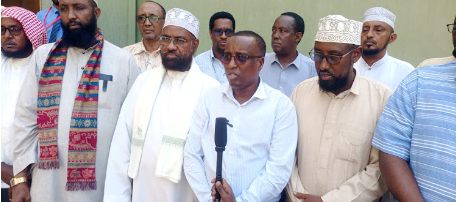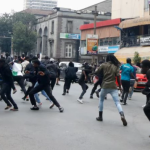The County Assembly of Garissa has initiated the process of drafting legislation aimed at prohibiting the entry, transportation, distribution, sale, and use of miraa and muguka in the area.
Garissa is grappling with drug and substance abuse issues, with miraa and muguka being the predominant substances.
The steps involved in this process will include public participation and sensitization campaigns conducted in markets, mosques, and other public places. These efforts will culminate in demonstrations and ultimately the passing of legislation.
Speaking to the press at the assembly premises after a meeting with Muslim religious leaders from Garissa, Speaker Abdi Idle highlighted that the assembly’s objective is to draft a bill that will address this issue comprehensively.
He emphasized the significance of involving religious leaders in the initial stages of the process, recognizing their pivotal role in conveying important matters to the community.
“We have had a very fruitful engagement with the religious leaders based on issues that are of concern to the people of Garissa county whom we represent. They range from drugs abuse among them muguka that have destroyed families and lives not only Garissa, but to many others parts of the country,” he said.
Sheikh Hussein Mahat who spoke on behalf of clerics during the meeting with the MCAS said as leaders, they all have a role to play in safeguarding the society off drugs and all the harmful things affecting the community.
“As religious leaders, we welcome this kind of gesture from the assembly. We appreciate their support led by the speaker. We are ready to closely work with them as well as the executive that is headed by the governor to ensure these harmful drugs are eradicated from our society,” Sheikh Mahat said.
He called on the national government to join hands and support Coast and Northern Kenya counties and their leadership in fighting drugs.
“We also have the right to fight these drugs that are causing havoc in our communities. We ask for the same support from the national government as the one it has shown in fighting alcoholism in Mt Kenya region.
Majority leader Mohamed Abdi described the meeting with the clerics as a productive one, adding that as an assembly, they will play their role in ensuring the harmful drugs are eradicated from the society by coming up with relevant legislations.
“I want to say this is a new dawn for our people. An opportunity that we have as leaders to correct all the mess that has been made before. Leadership is about doing that which is right for your people. In this case we must rise up to the occasion and pass laws banning harmful drugs.
He criticized the National Assembly for passing a law classifying miraa and muguka as cash crops, which has posed challenges for local assemblies seeking to enact legislation banning their use.
Despite this setback, he expressed optimism that the law could still be amended at the national level. He assured that efforts would be made to fast-track the bill through the county assembly.
The Speaker urged residents to remain patient and provide necessary support, such as offering opinions and recommendations. He indicated that within two to three months, the required legislation should be in place.
Garissa Governor Nathif Jama also emphasized the importance of consultations before reaching a decision on the matter. He highlighted ongoing discussions with religious leaders, the assembly, elders, and other stakeholders to ensure broad support for any potential ban.
While acknowledging similar bans in Mombasa, Kilifi, and Taita Taveta counties, Governor Jama emphasized the need for extensive consultations to garner stakeholder support for the ban’s implementation.
Meanwhile, the ban in these counties has been temporarily suspended by the High Court in Embu, pending further debate on the issue.



